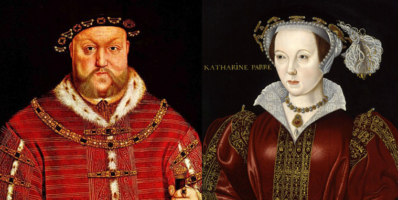
Henry VIII’s Last Wife
Being the wife of King Henry VIII was no simple task. On this episode of 5 Minutes in Church History, Dr. Stephen Nichols introduces us to Catherine Parr, Henry’s sixth and final wife.
 On July 12, 1543, Catherine Parr became the sixth and final wife of King Henry VIII. It was no simple task being the wife of King Henry VIII. One of his wives was beheaded, but this wife, his last wife, actually outlived him.
On July 12, 1543, Catherine Parr became the sixth and final wife of King Henry VIII. It was no simple task being the wife of King Henry VIII. One of his wives was beheaded, but this wife, his last wife, actually outlived him.
Catherine Parr was born in 1512. That very same year, Michelangelo completed his painting of the Sistine Chapel. Much of her life corresponds to epic moments and events of the Reformation. It was during her lifetime, of course, that Luther posted his Ninety-Five Theses in Wittenberg. She was alive and well while the Church of England separated from Rome through Henry’s Act of Supremacy. She had a copy of John Calvin’s Institutes of the Christian Religion. The first edition was published in 1536. She was even alive during the opening years of the Council of Trent. As we mentioned, she was married to Henry VIII in 1543. He would die in January 1547, succeeded by his son, Edward VI. Catherine would die the year after Henry’s death on September 5, 1548.
In her lifetime, she published two books. She published Prayers and Meditations and The Lamentations of a Sinner. He first book, Prayers and Meditations, is a beautiful set of prayers that basically revolves around two subjects. The first subject of these prayers is the confession of her weakness, which for us becomes a wonderful expression of our own weakness as men and women, as human beings. The second subject of these prayers is dependence upon God. At one point, she says,
“Oh Lord Jesus, make that possible by grace which is to me impossible by nature.”
This line, “Which is impossible to me by nature,” summarizes our weakness.
She talks about the times she found herself in anxiety, the times that she suffered, the times when troubling things came her way—all of these caused her look to God. At one point, she prays,
“Assist me in all things with thy grace, and so strengthen me with heavenly strength. . . . For thou, Lord God, art best, most wise, most high, most mighty, most sufficient, most full of all goodness, most sweet, most comforting, most fair, most loving.”
In her Lamentations of a Sinner, she talks about becoming a Christian.
“Such are the wonderful works of God, to call sinners to repentance, and to make them,” she says, “to take Christ” —what a beautiful expression, that God makes us “to take Christ”— “His well-beloved Son, for their Savior. This is the gift of God.”
She goes on to say that those who are Christians will have ten things produced in them. First, they embrace Christ with a fervency of spirit. Second, they rejoice in hope. Third, they are bold in danger. Fourth, they suffer in adversity. Fifth, they continue in prayer. Sixth, they bless their persecutors. Seven, they are not wise in their own opinion. Eight, they are neither high minded in their prosperity. Ninth, they are neither abashed in their adversity. Tenth, and lastly, Christians are humble.
Stay connected with 5 Minutes in Church History by getting the weekly podcast on iTunes, SoundCloud, or via RSS. You can also subscribe to the blog via RSS and follow us on Twitter and Facebook.
(This podcast is by Ligonier Ministries. Discovered by Christian Podcast Central and our community — copyright is owned by the publisher, not Christian Podcast Central, and audio is streamed directly from their servers.)